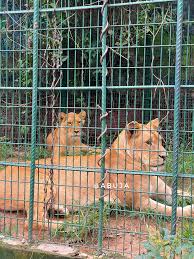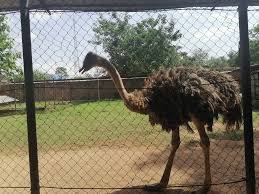![]()
If you’ve landed on this article page, you’re probably searching for a
good business idea—an idea that’s light on the pocket but heavy on
returns, promising both a fulfilling journey and potential profit.
|
How to Start a Private Zoo in Nigeria
Private zoos offer a unique opportunity for individuals who are
passionate about wildlife conservation and education to create a
space where people can connect with animals in a controlled
environment. Starting a private zoo requires careful planning,
extensive research, and a deep understanding of the
responsibilities involved.
This brings me to the first benefit of zoological gardens —
tourism revenue. Zoological gardens are magnets for tourists
seeking an opportunity to connect with wildlife. The allure of
exotic animals, educational exhibits, and interactive programs
draws visitors from both domestic and international markets.
Before embarking on the journey of starting a private zoo, it is
crucial to consider the financial commitment, time investment,
and dedication required. Running a private zoo involves
significant responsibilities, including providing proper care
for the animals, ensuring compliance with regulations, and
promoting conservation initiatives.
Defining Your Vision:
To establish a successful private zoo, it is important to
define your vision clearly. Consider the purpose and goals of
your zoo. Are you primarily focused on conservation, education,
or both? Identify the target audience and determine the type of
animals you want to exhibit. Your vision will guide the
decisions you make throughout the planning and operational
stages of your private zoo.
Location Selection: Choosing the right location for your private
zoo is crucial for its success. Consider factors such as
accessibility, size of the property, proximity to urban areas,
and the suitability of the environment for the species you plan
to exhibit. Conduct a feasibility study to evaluate potential
locations and assess any zoning restrictions or environmental
impact considerations.
Facilities and Enclosures: The design and construction of
appropriate facilities and enclosures are essential for the
well-being of the animals and the safety of visitors.
Collaborate with architects, zoologists, and animal behavior
specialists to create enclosures that mimic natural habitats and
provide enrichment opportunities for the animals.
Consider factors such as size, terrain, vegetation, temperature,
and the social needs of the animals when designing enclosures.
Ensure that the enclosures meet or exceed the minimum standards
set by regulatory bodies and animal welfare organizations.
Animal Acquisition: Acquiring animals for your private zoo
requires careful consideration and adherence to ethical
practices. Explore various methods of acquiring animals, such as
partnerships with reputable breeders, collaborations with
conservation organizations, or rescuing animals in need of a
home.
It is crucial to prioritize animal welfare and avoid supporting
the illegal wildlife trade. Ensure that the animals are obtained
legally and ethically, with proper documentation and veterinary
records.
Veterinary Care: Establishing a strong veterinary care program
is paramount for the health and well-being of the animals in
your private zoo. Collaborate with a qualified and experienced
veterinarian who specializes in exotic animals. Ensure regular
health check-ups, vaccinations, and preventive treatments for
all animals. Develop a comprehensive health care plan that
includes routine examinations, emergency care protocols, and
quarantine procedures for new arrivals. Maintain detailed
medical records to track the health history of each animal.
Feeding and Nutrition: Understanding the specific dietary needs
of each animal species in your private zoo is essential for
their proper nutrition. Consult with nutritionists,
veterinarians, and animal behavior specialists to develop
well-balanced diets that meet the nutritional requirements of
each species. Source high-quality food from reputable suppliers
and establish a feeding schedule that considers the natural
feeding patterns and preferences of the animals. Regularly
evaluate and adjust the diet as necessary to ensure optimal
health.
Enrichment and Behavioral Management: Promoting natural
behaviors and providing enrichment activities are crucial
aspects of animal care in a private zoo. Develop an enrichment
program that stimulates the physical and mental well-being of
the animals. This can include puzzles, toys, sensory
experiences, and opportunities for social interaction. Observe
the animals' behavior closely and make adjustments to the
enrichment program based on their individual needs and
preferences. Enrichment not only enhances the animals' quality
of life but also provides educational opportunities for
visitors.
Visitor Experience and Education: Private zoos have an important
role in educating visitors about wildlife conservation and
fostering a connection with nature. Design educational programs
and guided tours that cater to different age groups and
interests. Offer interactive exhibits, presentations, and
hands-on experiences to engage visitors and promote a deeper
understanding of wildlife and conservation issues.
Encourage visitors to participate in conservation initiatives
and provide them with practical ways to support animal welfare
and environmental sustainability.
Safety and Security Measures: Ensuring the safety and security
of both animals and visitors is of utmost importance in a
private zoo. Implement robust safety protocols and emergency
response plans to handle potential risks and unforeseen
situations. Install appropriate fencing, barriers, and signage
to prevent unauthorized access to animal enclosures. Regularly
inspect the premises and facilities to identify and address any
potential safety hazards. Train staff members in safety
procedures and conduct drills to prepare for emergencies.
Conservation and Breeding Programs: Participating in
conservation efforts and breeding programs can contribute to the
preservation of endangered species and the overall biodiversity.
Collaborate with recognized conservation organizations and
research institutions to support conservation initiatives.
Consider participating in breeding programs to maintain healthy
captive populations and potentially reintroduce animals into the
wild. Ensure that breeding programs align with the
recommendations and guidelines established by relevant
conservation authorities.
Marketing and Promotion: To attract visitors and raise awareness
about your private zoo, develop a comprehensive marketing and
promotion strategy. Utilize various marketing channels, such as
social media, websites, local advertising, and partnerships with
tourism agencies. Create engaging content that highlights the
unique experiences and educational opportunities your private
zoo offers. Collaborate with local businesses, schools, and
community organizations to expand your reach and foster
community engagement.
Acquire the animals: When the facilities are ready, get the
animals with which you want to stock up your zoo. If you have no
idea where to get the animals, search on the internet for zoo
animal suppliers around you. You could equally ask someone with
experience in that sector. You can also reach out to other zoos.
Stock up your zoo with as many animals and species as possible.
If you cannot acquire many breeds at the initial stage, endeavor
to acquire the rare ones and gradually improve your stock as the
business moves on.
Financial Planning and Funding: Creating a solid financial plan
is essential for the sustainability and growth of your private
zoo. Develop a detailed business plan that includes projected
expenses, revenue streams, and long-term financial goals.
Consider operational costs, animal care expenses, staffing,
marketing, and maintenance. Explore various funding options,
such as grants, sponsorships, partnerships, donations, and
admission fees. Seek financial advice from professionals
experienced in the zoo or non-profit sector to ensure a stable
financial foundation.
Ticketing and Pricing Strategies: Determining the appropriate
ticket prices and pricing strategies is crucial for attracting
visitors while generating sufficient revenue. Consider factors
such as operating costs, market demand, and the value you offer
to visitors.
Offer different types of tickets, including general admission,
group rates, and annual memberships. Consider bundling tickets
with additional experiences or perks to enhance the value for
visitors.
Collaborations and Partnerships: Collaborating with other zoos,
research institutions, and conservation organizations can
enhance the impact and reach of your private zoo. Exchange
knowledge, resources, and expertise with partners to further
conservation efforts and animal welfare. Participate in
cooperative breeding programs and share research findings to
contribute to global conservation initiatives.
Environmental
Sustainability: Operating an environmentally sustainable private
zoo demonstrates your commitment to conservation and responsible
practices. Incorporate environmentally friendly measures such as
energy-efficient infrastructure, renewable energy sources, water
conservation, waste management, and recycling programs. Educate
visitors about the importance of environmental sustainability
and inspire them to adopt sustainable practices in their daily
lives.
Continuous Learning and Improvement: To stay at the forefront of
the industry, embrace continuous learning and improvement. Stay
updated on advancements in animal care, welfare, conservation
practices, and educational techniques. Attend conferences,
workshops, and seminars related to zoology, wildlife management,
and conservation.
Encourage staff members to pursue professional development
opportunities and support their participation in relevant
training programs and certifications.
Crisis Management and Emergency Preparedness: Preparing for
crises and emergencies is crucial to protect the well-being of
animals, staff, and visitors. Develop a comprehensive crisis
management plan that includes protocols for natural disasters,
disease outbreaks, animal escapes, and other emergencies.
Conduct regular drills and training exercises to ensure that all
staff members are familiar with their roles and responsibilities
in different scenarios.
Maintain communication channels with local authorities,
emergency services, and veterinary professionals to seek
assistance during emergencies.
Visitor Feedback and Satisfaction: Visitor feedback is
invaluable in improving the visitor experience and identifying
areas for enhancement. Encourage visitors to provide feedback
through surveys, comment cards, or online reviews. Actively
listen to visitor suggestions, address concerns, and implement
changes based on their feedback. Regularly assess visitor
satisfaction and monitor visitor trends to adapt your offerings
and continuously improve the visitor experience.
starting a private zoo requires meticulous planning, a deep
commitment to animal welfare, and a passion for conservation and
education. By defining your vision, complying with regulations,
providing quality animal care, and offering engaging visitor
experiences, you can create a successful and impactful private
zoo.
Looking to the future, continue to expand your conservation
efforts, strengthen partnerships, and embrace advancements in
animal welfare and educational practices. Strive for continuous
improvement, always prioritizing the well-being of animals, the
satisfaction of visitors, and the promotion of environmental
sustainability. With dedication and a long-term vision, your
private zoo can make a significant contribution to wildlife
conservation and inspire generations to protect our natural
world.
The financial injections from sponsorships can fund
infrastructure development, research initiatives, and
educational programs, indirectly contributing to the overall
economic health of the country. Let me reference London Zoo
again — it has tens of honorary fellows, patrons and donors,
corporate supporters, charities, and trusts helping advance its
cause.
Zoological gardens are not just havens for wildlife; they are
dynamic economic contributors that resonate beyond their
enclosure walls. If Nigeria recognizes the multifaceted benefits
of these institutions, we can unlock the full economic potential
of our zoological gardens.
By fostering a delicate balance between conservation, education,
and economic growth, our zoos can truly roar as engines of
prosperity for Nigeria. Structure, systems, and intelligence
aimed at resurrecting these institutions is all we need to begin
with.
Get our Training Guide on How to set up a Private Zoo in
Nigeria. This comprehensive guide provides all the necessary
information for beginners to launch their own Private Zoo. This
guide covers the entire process of getting your own Zoo. With
meticulous planning, a sizable upfront investment, recruiting
skilled manpower, and a sharp focus on product quality and
customer service, your Private Zoo can capture a rewarding share
of this high-potential market.
|







